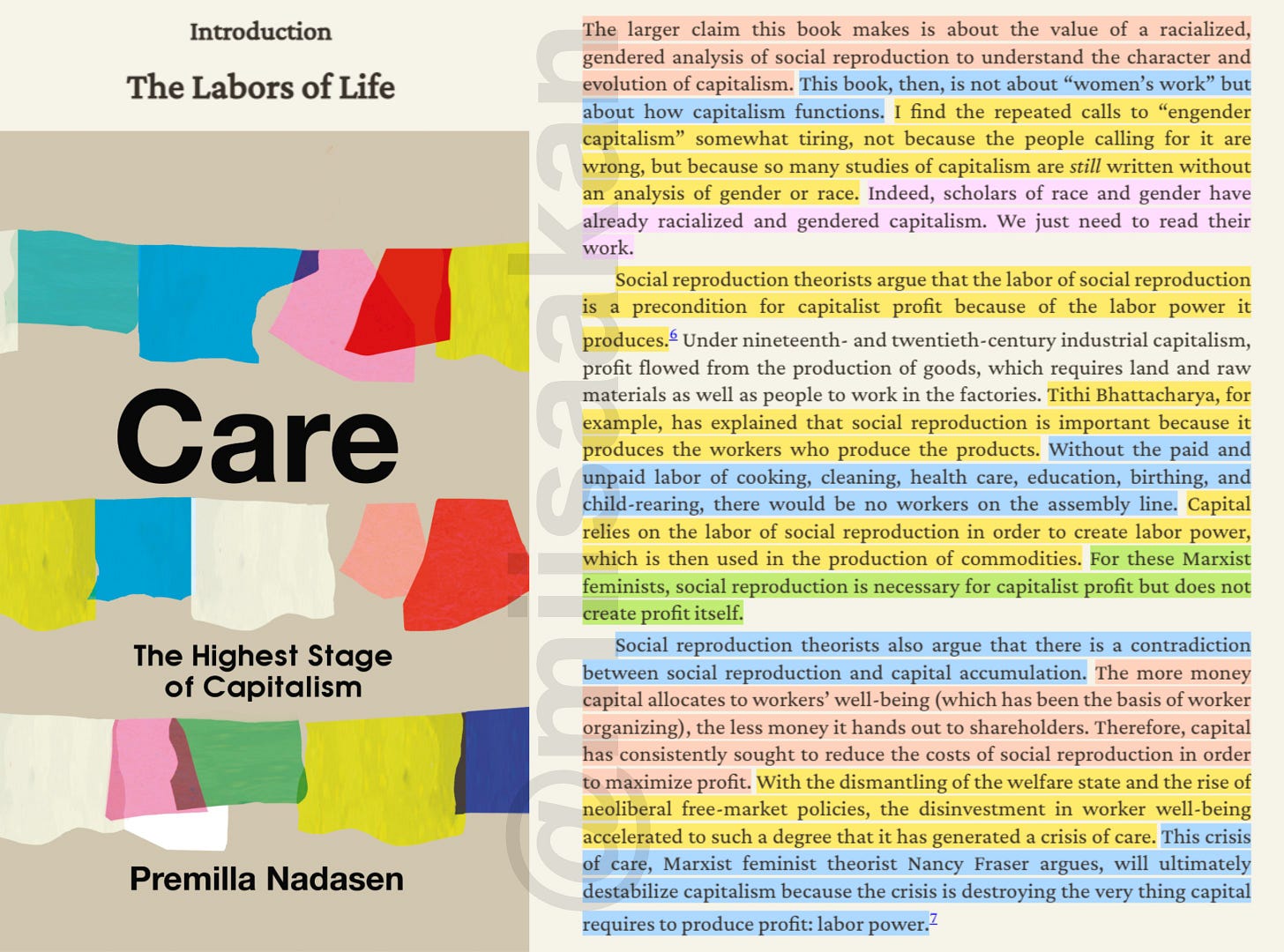How Marxists Turned Motherhood and Housework Into a Revolutionary Threat
Reading the Revolution: A series exposing what the far left reads and believes.
Reading the Revolution is a series breaking down the books that leftists are reading and writing to understand how they think, what they believe, and where they’re headed. These posts live in the Counter-Revolutionary Book Club and are designed to give you a fast, no-fluff hit of key insights—so you don’t have to read 300 pages of Marxist jargon to know what’s inside.
Full credit goes to Mîsâkan on X, a sharp member of my community who actually reads this stuff and shares detailed notes on his account. I’m publishing them here to expand his reach and help more people decode what the far left is saying behind the scenes. Go follow him and share his work—he’s doing real intellectual recon.
Care: The Highest Stage of Capitalism by Premilla Nadasen
The radical left has a long-standing theory, revived and reframed: capitalism isn’t just exploitative—it’s self-destructive. According to Marxist feminists, the system is slowly killing itself by refusing to value the one thing it needs most: the people who create and sustain its workforce.
That’s the argument laid out in Care: The Highest Stage of Capitalism by Premilla Nadasen. The book is built around what leftist academics call social reproduction theory—the idea that capitalism relies not just on waged labor, but on the unpaid and underpaid labor that happens in homes, schools, hospitals, and daycare centers. This includes everything from raising children to caring for the elderly. In Marxist terms, it’s the labor that creates labor power—the capacity of human beings to participate in the formal economy.
At the heart of this theory is a contradiction the left believes will collapse the system from within.

Capitalism’s Dependency on Invisible Labor
The claim is simple: capitalism depends on care work, but refuses to support it. That includes:
Cooking and cleaning
Child-rearing and education
Healthcare and elder care
All of this, they argue, is essential to producing and sustaining the workforce. Without it, there are no functioning workers to exploit. But because this labor doesn’t produce a direct profit, the system ignores it—or worse, offloads it onto unpaid women and underpaid service workers.
“Capital relies on the labor of social reproduction in order to create labor power, which is then used in the production of commodities.”
This is the foundation of social reproduction theory. The unpaid domestic labor that takes place outside the marketplace is what makes the marketplace possible.
The Crisis of Care
According to the book, capitalism’s refusal to fund or support this essential care infrastructure has created a breaking point—a crisis of care. As governments cut welfare programs, privatize public services, and shift responsibility back onto individuals, the social fabric begins to unravel.
The more the system prioritizes profits, the less it invests in the human beings who keep it alive. Public funding dries up. Healthcare workers burn out. Families are crushed under the weight of caregiving. The result? Capitalism begins to eat itself.
“This crisis of care… will ultimately destabilize capitalism because the crisis is destroying the very thing capital requires to produce profit: labor power.”
To the Marxist left, this isn’t just a social problem—it’s proof that capitalism is unsustainable by design.
Why the Left Thinks This Matters
Here’s the ideological structure they’re building:
Care work underpins capitalism. It produces and sustains workers.
Capital refuses to pay for it. Because it isn’t profitable.
The system burns out caregivers. Families, communities, and public institutions are stretched past their limits.
This burnout creates systemic instability. The very labor force capitalism needs begins to fracture.
Therefore, capitalism cannot survive. Its own internal logic ensures collapse.
This theory now underwrites many of the left’s demands: universal childcare, Medicare for All, state-funded education, housing as a human right, and even the abolition of the nuclear family. It positions care as the next revolutionary front—framing caregivers as an exploited class and the home as a political battleground.
The Endgame
In the worldview presented by Care: The Highest Stage of Capitalism, the future of the economy doesn’t hinge on production or innovation—it hinges on whether society is willing to collectivize care. If not, the left argues, the system will continue cannibalizing its own foundation until there’s nothing left.
To them, capitalism isn’t just unjust—it’s suicidal. And in the breakdown of care, they see its death spiral already beginning.
The Counter-Revolutionary Book Club is a defiantly anti-communist series dedicated to dissecting and analyzing the far left's most audacious texts and ideas. Explore a curated collection of documents and podcasts in the Book Club section—where intellectual resistance begins.
If you value my work, consider supporting it for just $8/month or $80/year. Your support is the lifeline of this project—I’m 100% funded by readers like you. Without it, this analysis wouldn’t be possible.
Your support makes this work possible. Learn how to help here.







And it is soooo convincing, especially to those who do see pitfalls and are desperate for change. Only the change they demand will be a path to hell paved with good intentions.